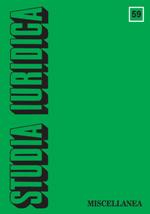Roszczenie regresowe państwa do innych jednostek publicznych oparte o naruszenie prawa międzynarodowego
Recourse of the State against a Public Entity for Infringement of International Law
Author(s): Jakub J. SzczerbowskiSubject(s): Law, Constitution, Jurisprudence
Published by: Wydawnictwa Uniwersytetu Warszawskiego
Keywords: prawo; nauki prawne; teoria i praktyka prawa; law; legal science; theory and pratcical law
Summary/Abstract: The goal of this paper is to analyse the law and economics of some aspects of the application of international law. Public entities (e.g. local governments, hospitals, universities) might cause damage to individuals, which is not recoverable under domestic law, but it can be recovered under international law, be it the European Union law or other international law system. On grounds of international law, usually the state is liable for damage regardless of the true tortfeasor. The cases in mind have one factor in common. While damage is being done, a public entity acts in conviction of its actions being in accord with the law. Having no expertise in international law, even if the law is formally a part of the domestic legal system, the public entity causes damage (as defined on grounds of international law) to an individual. The individual then seeks compensation in the domestic administration of justice and in the lack of it turns to international tribunals. International disputes, however, will change the parties to the procedure. Instead of the tortfeasor, the state will take a position of the defendant. This situation creates a problem: Should the state seek compensation from the public entity? If such a public entity has a separate legal personality, the state has possibility to seek compensation from its assets. On the surface it seems rational to sue the public entity; it would put the economic burden of the damage on the true tortfeasor and serve as means of motivating the potential tortfeasors to spend extra resources in order to prevent future infringements of international law. The economic analysis shows this is not the case and that such practices might lead to inefficiencies. The inefficiencies are caused by a) cost of litigation, b) lack of specialization in interpretation of international law by public entities and c) inefficient avoidance cause by excessive spending by public entities. This paper presents an economic model that is useful in deciding whether recourse should be available between the state and other public entities. This text is as a set of guidelines for lawmakers and is not indented to provide insight related to interpretation of statutes.
Journal: Studia Iuridica
- Issue Year: 2014
- Issue No: 59
- Page Range: 275-283
- Page Count: 9
- Language: English

